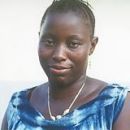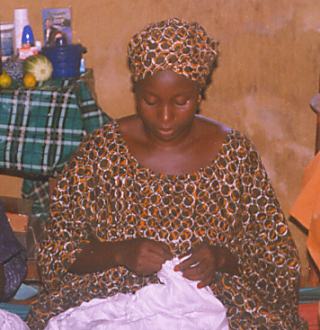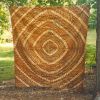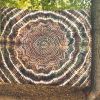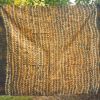Gara (tie-dye), Sierra Leone
Hawa comes from the Mende ethnic group that constitutes 32% of Sierra Leone's population. The Mende are a peaceful and family oriented people. They are also known for their fairness, openness and extensive knowledge of farming. While growing up, Hawa helped her family with rice planting and cultivation, cooking, childcare, and basic household upkeep. Like most women in her rural farming community, when Hawa reached puberty she attended the women's traditional, or Bundu, school. Here she learned the history, culture, traditions, songs and dances of the Mende as well as her role in society. It was during this time that Hawa began to think about becoming a specialist in Gara, or traditional fabric dying.
Growing up, Hawa had heard many stories about her grandmother who had been a Gara specialist. These stories inspired her to apprentice with her aunt, Kadijatu Kamara, to learn traditional tie-dying techniques. So in 1989, at the age of 17, Hawa moved more than 200 miles to Sierra Leone's capital city, Freetown. Here she began her study of Gara while living and working with her aunt. Hawa spent 7 years learning Gara from her aunt and in 1995 decided to apprentice with Pa Foday, the top Gara specialist in Sierra Leone. Hawa and Pa Foday decided to marry shortly after Hawa moved into Pa Foday's compound and since their marriage Hawa has continued to study and learn Gara work.
In 1990, one year after Hawa moved to Freetown, a rebel war spread from Liberia into Hawa's home area. This war eventually spread to the entire country and has continuing up to today. Due to this conflict many people have had to flee their homes leaving all possessions behind. The war has killed thousands and displaced more than 1 million people. Sierra Leone's economy is in a shambles and all agricultural production has stopped. In the interior, the majority of hospitals, schools and businesses have been shut down or destroyed. Hawa's own mother spent almost 4 months hiding in the bush before a family friend rescued her and brought her to Freetown for a reunion with her daughter. Hawa's mother died in 1995 due to health complications caused by the war and her brothers have lived in a refugee camp for more than 5 years.
At this time Hawa is the sole supporter of her immediate as well as extended family. The recent death of Hawa's elder brother Amara has left Hawa with the additional responsibility of caring for Amara's 5 young children. The normal daily struggles of providing for a family have been multiplied by continuous war and a lack of foreign relief intervention. All sales of these Gara fabrics will directly help to support Hawa and her entire family. The proceeds will buy much needed food, medicine, clothing and supplies. Thank you for your interest and support.
